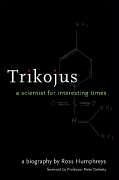Professor, Victor Trikojus exerted enormous influence on the development of biochemistry in Australia. His forceful personality and his ability to master intricate detail meant that he also imposed considerable influence on academic affairs, particularly at the University of Melbourne. Trikojus established his reputation through researching Thyroid malfunction. It was during World War Two that his scientific work shone. He identified and manufactured many drugs, particularly sulphaguanidine, which controlled bacillary dysentery and was essential to the welfare of Australia's fighting forces, particularly in the New Guinea campaign. Yet during this war his professional relationship with German science and industry brought him under suspicion and he was forced to defend charges of subversion for which he was briefly imprisoned. In "Trikojus", Ross Humphreys reveals the courageous and clever man behind this intriguing scientist.
Hinweis: Dieser Artikel kann nur an eine deutsche Lieferadresse ausgeliefert werden.
Hinweis: Dieser Artikel kann nur an eine deutsche Lieferadresse ausgeliefert werden.








